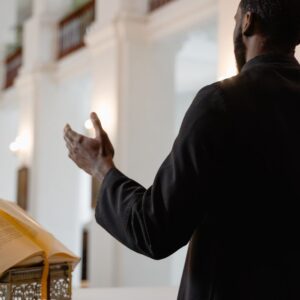In a time when division characterizes the American landscape, the question “What does it mean to follow Jesus?” becomes more urgent and challenging than ever. Jesus’s teachings have always been countercultural, but in today’s climate of polarization, echo chambers, and identity politics, faithfully following Jesus means resisting the pull of division and instead embodying a deeper, often costly form of love.
Following Jesus in divided America isn’t about choosing sides. It’s about choosing Jesus over sides.
The Temptation of Tribalism
We are living in a cultural moment where identity is often defined in opposition to others. Political, religious, and regional loyalties can become shortcuts to moral worth. In this climate, the temptation is strong to align our faith with our tribe, whether progressive or conservative, rural or urban, red or blue. But Jesus didn’t come to be the chaplain of our tribes. He came to call us into a new Kingdom.
When Jesus walked the earth, he entered a divided world. His people were under Roman rule, where zealots called for violent rebellion. Pharisees demanded strict religious purity, Sadducees collaborated with the empire, and ordinary people were simply trying to get by. Jesus gathered disciples from across this spectrum, including Matthew the tax collector and Simon the Zealot, forming a community not based on ideology but on apprenticeship to him.
If we’re truly following Jesus today, we won’t fit neatly into any partisan box. That doesn’t mean we’re neutral; it means we’re willing to disappoint every side for a deeper purpose: the call to love God and love our neighbors, even when they vote differently, live differently, or see the world through a different lens.
A Gospel of Reconciliation
At the core of Jesus’ life and message is reconciliation between God and humanity, God and creation, and among people themselves. As Paul writes in 2 Corinthians 5:18, “God… gave us the ministry of reconciliation.” This is not soft tolerance or spiritual niceness; it’s a challenging commitment to healing what has been torn apart.
In a divided America, reconciliation involves resisting stereotypes. It means refusing to judge people based on their worst opinions or political labels. It also means staying engaged when others walk away. It’s about asking better questions like “What has shaped your story?” instead of “Whose side are you on?”
Reconciliation doesn’t mean avoiding difficult truths. Jesus never shied away from conflict, but he approached it with a heart focused on healing. He confronted religious hypocrisy, called out injustice, and challenged the powerful, but he also made room for the outcast, ate with sinners, and prayed for his enemies. If we are his followers, we must do the same.
The Way of the Cross
Following Jesus in a divided America also means rejecting the myth of dominance. Too often, Christians confuse cultural power with faithfulness. We want to “win” America for Jesus, often by controlling narratives, policies, or public morality. But Jesus’ way is not the way of the sword; it’s the way of the cross.
The cross is not a political tool; it is a symbol of sacrificial love. Jesus did not conquer his enemies; he died for them. He did not retaliate against injustice; he absorbed it and forgave. To follow Jesus is to let go of winning and instead embrace the slow, vulnerable work of love. This may mean losing social capital, being misunderstood, or standing in unpopular places. But it also means becoming free—free from the need to be right, to be dominant, or to be safe.
Listening as a Spiritual Practice
One of the most radical acts a Jesus-follower can do in this divided era is to listen. Not to reply or argue, but to truly understand. Deep listening, especially to those we disagree with, is a spiritual discipline that calls for humility, empathy, and curiosity.
Jesus was a master listener. He perceived the unspoken cries behind questions. He engaged with people on the margins: women, foreigners, lepers, sinners, and honored them by listening. In a noisy, argumentative culture, we can embody Christ simply by being quiet enough to hear someone’s story.
To listen well, we must de-center ourselves. We must practice what Philippians 2 calls us to: “In humility value others above yourselves, not looking to your own interests but each of you to the interests of the others.” That doesn’t mean we abandon our convictions. It means we carry them gently, with compassion, not as weapons but as invitations.
Church as a Countercultural Community
The local church is called to be a living example of the Kingdom of God. In a divided society, the church should serve as the one place where people of different backgrounds, experiences, and perspectives come together in mutual love. “How is it possible that the gospel should be credible …? I am suggesting that the only answer, the only hermeneutic of the gospel, is a congregation of men and women who believe it and live by it.” — Lesslie Newbigin, The Gospel in a Pluralistic Society (London: SPCK, 1989)
Sadly, churches have often reflected the very divisions they are called to heal. We’ve split along political lines, cultural preferences, and worship styles. But Jesus’s call is for something more radical. In John 17, Jesus prayed for his followers to be one, not so they’d all think alike, but so the world would recognize the love of God.
This unity is not the same as uniformity. It’s the miracle of diverse people united by grace. Being this kind of church in divided America is a prophetic witness. It shows, through our lives, that another way is possible, that we can belong to each other even when we disagree.
Courage and Hope
Following Jesus in a divided America requires courage. It takes bravery to speak out when others remain silent. It demands courage to sit at tables where you don’t feel at home. It calls for forgiveness, resisting cynicism, and holding onto hope when everything around you seems fractured.
But hope is exactly what we have. Not because the culture will change. Not because we’ll win the next election. But because Jesus is risen. Because the tomb is empty. Because the Spirit is still working in the world, and the Kingdom continues breaking through.
We do not follow Jesus because it is easy. We follow him because he is Lord. Because his way leads to life, even through the cross. Because his love casts out fear. Because his peace is deeper than any partisan platform. Because he is making all things new—here and now.
Practical Ways to Follow Jesus Today
So, what does it look like, practically, to follow Jesus in a divided America? Here are a few ways to start:
- Practice curiosity rather than judgment. When you encounter a view you disagree with, ask: “What story shaped this person?”
- Create a new set of rules for conversations. You can respond with “Wow, I see that differently. I would love to listen to you with respect as long as you listen to me respectfully.” (Brian McLaren)
- Prioritize presence over polarization. Build relationships across differences. Avoid retreating into safe silos.
- Model confession and repentance. Take responsibility for where you’ve contributed to division or harm. Let humility guide you.
- Be generous with your time and resources. Seek opportunities to bless those who are suffering, isolated, or ignored.
- Pray for your enemies. This isn’t just a pious suggestion; it’s a powerful act of discipleship.
- Stay grounded in Scripture and prayer. Let your heart and mind be molded more by Jesus than by cable news or social media.
Ultimately, following Jesus in a divided America means choosing the difficult path of love, engaging in the messy work of reconciliation, and dying to self every day to make room for resurrection. It’s about belonging, not to a side, but to a Savior and living as if his Kingdom is both our hope and our purpose.
At the Center for Transforming Engagement, we wholeheartedly believe that we can do better at having these conversations. Find out what we offer by clicking here.
Sources
-
- Ministry Matters: “Facilitating Difficult Conversations” – Practical guidance for church leaders on race and equity discussions https://ministrymatters.com/2016-11-07_facilitating_difficult_conversations/
- “Fierce Conversations: Achieving Success at Work and in Life One Conversation at a Time” by Susan Scott
- “Do I Stay Christian?: A Guide for the Doubters, the Disappointed, and the Disillusioned” by Brian McClaren










0 Comments